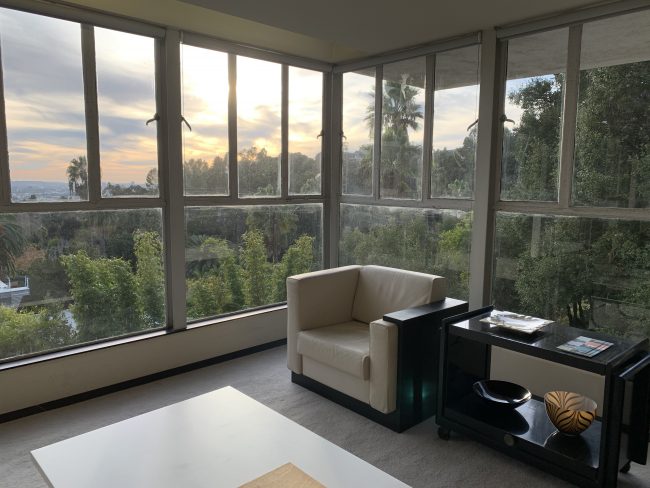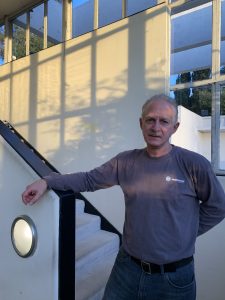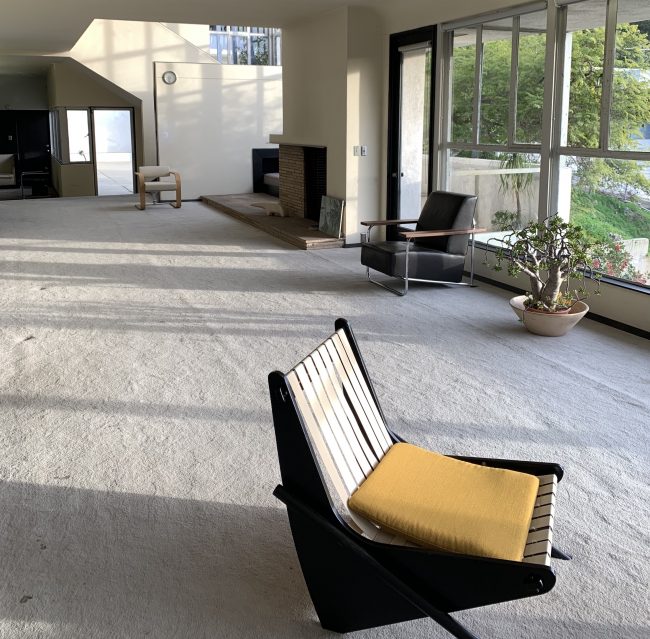Richard Neutra’s austerely elegant, extravagantly windowed Lovell Health House in Los Angeles has long been regarded as a residential icon of International Style.
Built on a Los Feliz hillside just east of the Griffith Park Observatory, the modern steel-framed residence helped propel Neutra to worldwide fame when finished in 1929.
But these days, the historic home has grown a bit tattered. With the recent death of its longtime owner, Betty Topper, the Lovell House will require heaps of attention, both cosmetic and structural, from a new owner.

View of Los Feliz from Neutra’s Lovell House (Credit: Tina Daunt)
Topper’s five adult children are opening up the 4,807-square-foot home for tours and private events, with an eye toward eventually putting it up for sale.
Famous since its image was included in the groundbreaking 1932 exhibit organized by Philip Johnson, the Lovell House was acquired by Betty and Morton Topper in 1960. Though Morton died in 1971, Betty went on living there until her death in August.
Their son, Ken, still lives in the home. He has recently begun allowing preservationists and, perhaps, prospective buyers, to walk through the property.
“My mom would want to see someone become a proper steward for the house,” Ken said in an interview at the home earlier this month. “This place became very special to her. She left it for people to enjoy it.”

Ken Topper at Neutra’s Lovell House (Credit: Tina Daunt)
Betty didn’t take to the Lovell House right away, however. Her first impression wasn’t favorable, but it was already too late – Morton had bought it for $60,000 without consulting her.
The home, perched on a hillside with wall-to-wall windows, was not the most practical place to raise five rambunctious children.
Ken recalled that he and his siblings would often throw things at each other — and occasionally at the windows. A repairman was always coming by to install new panes of glass.
Ken also remembers Neutra frequently dropping in uninvited, often with students or prospective clients in tow. The master architect took umbrage to seeing his meticulously designed creation run over by its residents.
“Neutra would come in and start yelling: What have you done to my house?” Ken recalled. “We thought, ‘who is this crazy guy saying this is his house?’”
But, later, Ken and his siblings came to appreciate that they grew up in a masterpiece. Despite its battle scars, the Lovell House was still transcendentally beautiful during a January visit, bathed with light, one space flowing effortlessly into another.
Neutra was commissioned to do the home by local celebrity Philip Lovell, who arrived in Los Angeles in the early 1920s and set up a successful naturopathic medical practice Downtown.
Even by L.A. standards, it was something of a golden age for dietary and medical eccentrics (the city had the country’s first raw vegetable cafeteria). Lovell, née Morris Saperstein, had the good fortune to count among his patients Los Angeles Times publisher Harry Chandler, who credited the physician with curing his tuberculosis and rewarded him with a weekly advice column.
Lovell had commissioned Rudolph Schindler to build him getaways in the desert, mountains, and (most famously) in Newport Beach. Nevertheless, he selected Neutra to build him a family home at 4616 Dundee Drive, on an incline so steep many regarded it as unfeasible to build on.

Living room at Neutra’s Lovell House (Credit: Tina Daunt)
The Viennese-trained architect gave his client the country’s first steel-framed private home with everything fabricated offsite and brought there for assembly. Walls were sprayed with the then-novel covering gunite, and even the signature windows were all stock building supply items.
To hold down costs—Lovell had been irked by Schindler’s budget overruns—Neutra served as his own contractor. When completed, the house had multiple outdoor sleeping porches, space for a day school Leah Lovell ran, a kitchen designed specifically for a vegetarian diet, and private nooks for nude sunbathing,
Masterpiece or not, some of the ordinary rules of L.A. real estate still apply to the Lovell House.
The Topper heirs now are hoping their series of tours may generate an off-market transaction to a sympathetic buyer.
On January 26, the Toppers will host a screening and discussion of Elissa Brown’s film “Windshield: A Vanished Vision,” which documents Neutra’s residence on Fishers Island, New York.
The public events have already raised the profile of the estate, with visitors posting a steady stream of photos on Instagram.
Though no numbers have been thrown around yet, the sale price will likely be steep: The 5,500-square-foot Ennis House, a Los Feliz property built in the Mayan Revival style by Frank Lloyd Wright, sold for $18 million in October.
Pedigree, even when a bit down at the heels, doesn’t come cheaply in this town.
